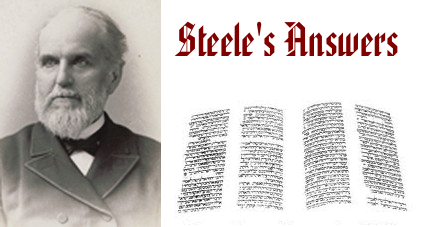QUESTION: In what sense are Christian believers freed from the Law?
ANSWER: (1.) It is true that all mankind are, by the atonement, forever freed from the necessity of pleading that we have perfectly kept the law, in order to acceptance with God. We are freed from the necessity of legal justification. Such a necessity would shut up a sinful race in eternal despair. We are freed from the law as the ground of justification. Our ground of justification is the blood of Christ shed for us.
(2.) Nor are true believers, who have received the Spirit of adoption, under the law as the impulse to service. They are not spurred on to activity by the threatened penalties of God's law. Love to the Law-giver has taken the place of fear of the law as a motive. This is specially true of those advanced believers, out of whom perfect love has cast all servile, tormenting fear. Before emerging into this experience, there is a blending of fear and love as motives to service. In this state the believer is not wholly delivered from legalism. But the law is put into the heart of the full believer, and its fulfillment is spontaneous and free. "I will run the way of Thy commandments when Thou shalt enlarge my heart." The Septuagint Version, used by our Lord Jesus, reads: "I have run .... Since," etc. "Without the law," says St. Paul, as an outward yoke laid upon the neck, "but under law to Christ." Love to Christ absorbs into itself all the principles of the moral law, and prompts to their glad performance. Hence, "Love is the fulfillment of the law." This is the meaning of Rom. vii. 6, as translated in the Revision which corrects the blunder of King James' version from a faulty MS., making the law of God die, instead of the believer's dying to it; that is, ceasing to be actuated by its terrors, and becoming obedient from the new principle of love. "But now we have been discharged from the law, having died to that wherein we were holden; so that WE SERVE IN NEWNESS OF THE SPIRIT, and not in the oldness of the letter."
(3.) We are free from the law as the instrument of our sanctification. Christ has become our sanctification by purchasing with His blood the gift of the Holy Spirit. He is called "holy," not as a peculiar attribute, distinguishing Him from the Father and the Son, but because it is His great office to make men holy. We are "elect through sanctification of the Spirit and belief of the truth."
(4.) Christ has freed us from the ceremonial law.
(5.) Believers in Christ are not delivered from the moral law, as the rule of life. The form of this law may change, but the essence is as immutable as its Author, out of whose bosom it goes forth.
A moral intelligence, whether man or angel, thus freed from his proper norm, would dash into ruins like a locomotive or an express train freed from the rails. As the rails give direction to the mighty momentum of the train, so is the law designed to direct our moral progress to a destiny of unspeakable blessedness. Disobedience derails and destroys. Hence the law is a blessing of unspeakable value. The soul that despises it is in imminent peril. The theology which teaches that men mount to a "happy condition," by ridding themselves of the beneficent guidance of the moral law, merits the condemnation of all Christians. Jesus is a Law-giver to control, as well as a Redeemer to save.
